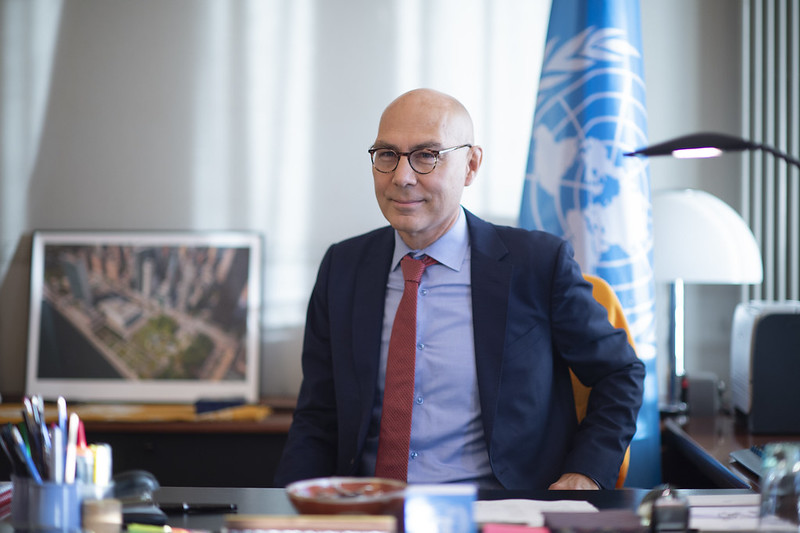U.N. High Commissioner for Human Rights Volker Türk has declared the war on drugs a failure. He urged world leaders to prioritize health-focused, evidence-based approaches over punitive measures, citing their inability to curb drug use or societal harm. He highlighted successful examples like Portugal, where such measures reduced drug-related infections and stigma while lowering drug use rates.
U.N. High Commissioner for Human Rights Declares the War on Drugs a Failure


The United Nations High Commissioner for Human Rights, Volker Türk, has called on world leaders to treat drug use as a health issue, declaring that “the war on drugs has failed—completely and utterly.”
Speaking at the Dealing with Drugs II conference in Warsaw, Poland, Türk emphasized that punitive drug policies have not only failed to reduce drug use but have also exacerbated societal harm and violated human rights.
“The evidence is clear. The so-called war on drugs has failed—completely and utterly. Prioritizing people over punishment saves more lives,” the human rights commissioner stated.
He highlighted the inability of criminalization and prohibition to deter drug-related crimes or protect vulnerable groups in society. His remarks resonate amid rising global production, distribution, and consumption of narcotics.
For more news like this, along with all the latest in legalization, research, and lifestyle, download our free cannabis news app.
A Global Human Rights Crisis Amid Ongoing Drug Trafficking and Consumption
The Human Rights Commissioner’s concerns come against the backdrop of increasing drug production and trafficking. Despite an initial drop in opium cultivation following the Taliban’s prohibition in Afghanistan, the opium trade has rebounded, with heroin exports rising 19% in 2024. Iran continues to receive a steady influx of heroin while also grappling with a surge in synthetic drugs like crystal meth and captagon.
In Europe, the cocaine market is now valued at $33 billion. Meanwhile, in North America, the opioid crisis has reached catastrophic levels, with synthetic opioids such as fentanyl driving unprecedented mortality rates in the United States and Canada. Punitive measures have failed to address the complex challenges associated with drug use.
A Call for Evidence-Based Policies and Decriminalization
Türk, the U.N. high commissioner on human rights, advocates for evidence-based approaches that prioritize health and social integration over punishment.
“We must start treating the person and stop punishing the disorder of drug use,” he stated.
His vision includes decriminalization paired with harm-reduction strategies such as education, social reintegration, and public health initiatives. These approaches aim to reduce the stigma surrounding drug use, mitigate its risks to society, and address basic human rights concerns.
Evidence from harm-reduction policies shows that addressing drug use as a health issue rather than a crime can yield measurable benefits. For instance, Portugal’s focus on social reintegration has reduced drug-related infections, while prioritizing human rights and education over incarceration has been linked to lower rates of drug use.
—
(Featured image courtesy of UN Geneva (CC BY-NC-ND 2.0) via Flickr)
DISCLAIMER: This article was written by a third-party contributor and does not reflect the opinion of Hemp.im, its management, staff, or its associates. Please review our disclaimer for more information.
This article may include forward-looking statements. These forward-looking statements generally are identified by the words “believe,” “project,” “estimate,” “become,” “plan,” “will,” and similar expressions. These forward-looking statements involve known and unknown risks as well as uncertainties, including those discussed in the following cautionary statements and elsewhere in this article and on this site. Although the company may believe that its expectations are based on reasonable assumptions, the actual results that the company may achieve may differ materially from any forward-looking statements, which reflect the opinions of the management of the company only as of the date hereof. Additionally, please make sure to read these important disclosures.
First published in Newsweed, a third-party contributor translated and adapted the article from the original. In case of discrepancy, the original will prevail.
Although we made reasonable efforts to provide accurate translations, some parts may be incorrect. Hemp.im assumes no responsibility for errors, omissions or ambiguities in the translations provided on this website. Any person or entity relying on translated content does so at their own risk. Hemp.im is not responsible for losses caused by such reliance on the accuracy or reliability of translated information. If you wish to report an error or inaccuracy in the translation, we encourage you to contact us.



Comments are closed for this post.